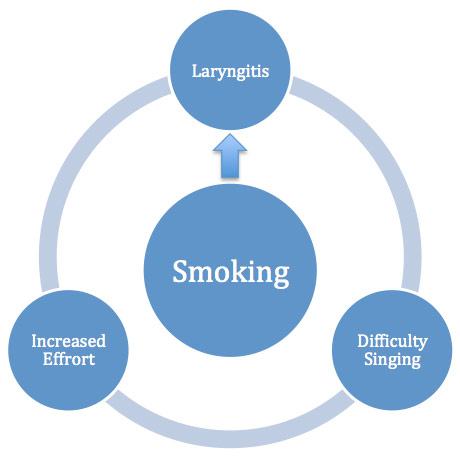- Question: How do the ingredients in e-cigarettes and vaporizers affect respiratory health? - August 16, 2019
- Bad Technique and Vocal Injury - January 9, 2019
- Is Edible Marijuana Dangerous for the Voice? Myths Dispelled - December 18, 2018
- Surprise! You have a hemorrhage - January 31, 2018
- Graves’ Disease: Treatment Overview - September 25, 2017
- Adele and the Stigma of Vocal Injury - July 11, 2017
- Vocal Curbside Consult: How does the thyroid affect the voice? - May 16, 2017
- Vocal Curbside Consult: How do hormones affect the voice? - May 3, 2017
- Vocal Curbside Consult: How do emotion and stress affect the voice? - April 17, 2017
- Vocal Curbside Consult: Vocal Recovery After Illness - April 7, 2017
While marijuana use is quite common in the general population, it is likely even more frequently seen within the entertainment community. Some artists state that they rely on the relaxing effects to help their songwriting, while others enjoy the social aspects. Regardless of the reason for use, the potential for a negative vocal impact is real and one that must be considered. It is not practical or necessary to suggest eliminating marijuana use. However, it is critical to educate users about the impact so that the vocal effects can be minimized.

How does Marijuana affect the voice?
There are many potential effects of marijuana on the voice. The effects are based on how marijuana is consumed.
The inhaled form (i.e., joint, volcano, vaporizer, etc), regardless of the method, results in vocal swelling called laryngitis. Some inhaled methods, such as a vaporizer, result in a lesser degree of laryngitis than others such as unfiltered joints.
A tired, rough, raspy, or hoarse voice are symptoms of laryngitis. Laryngitis is the gateway to more serious, and often permanent, vocal injury.
Can marijuana lead to serious voice problems?
Laryngitis occurs regardless of the device used to inhale marijuana. The singer must then strain to produce a normal voice; higher notes are particularly strenuous. This occurs because swollen vocal folds cannot vibrate freely to produce sound. Typically, a singer suffering from inhalation laryngitis will produce little to no sound when trying to sing quietly in the upper register because higher notes require faster vibration. Additional effort will need to be exerted to produce any sound at all and quiet singing is often not possible. This places extra strain on the swollen instrument, causing further inflammation.
These events can result in the development of nodules, a vocal hemorrhage (bruise), or vocal polyps. Scarring of the vocal folds, which is irreversible, may also develop

Does vocal damage occur after one use or multiple uses?
Inhalation of marijuana, even on one occasion, can irritate the vocal folds and cause laryngitis. If the voice user then attempts to use his/her voice in the following days to sing or speak, further damage can occur which can lead to vocal nodules, hemorrhages, polyps, or vocal fold scarring.
Can smoking marijuana lead to permanent voice damage?
Yes, without prompt evaluation and treatment, marijuana use can potentially lead to irreversible vocal damage. Marijuana use causes laryngitis which makes the vocal cords susceptible to vocal damage.
Many performers who smoke will not be able to obtain care for symptoms of vocal injury (hoarseness, tired voice, etc). Because the artist’s lifestyle is very busy and performances are not movable, care and voice rehabilitation are marginalized. Unfortunately, this behavior often causes permanent voice changes.
How do I know if I have damaged my voice by smoking marijuana?
If you have a raspy, tired, or rough sounding voice after smoking marijuana, you most likely have some vocal injury, even if temporary. Because the vocal cords are not visible without instrumentation, it is not possible for the singer to see the condition of their instrument.
In all cases of suspected vocal injury, stroboscopy by a qualified voice doctor, a laryngologist, and a voice therapist is highly recommended. Laryngologists are specially trained physicians that evaluate and treat disorders of the larynx (voice box).
Who should evaluate and treat my voice issues?
All cases of suspected vocal injury should be evaluated and treated by a qualified laryngologist and voice therapist team. These physicians specialize in disorders of the voice box (larynx). A skilled laryngologist works with a voice therapist to determine if there is any injury and counsel you about safer marijuana use.
To learn more about Dr. Reena Gupta or how marijuana affects the voice, please visit www.voicedoctorla.com.



